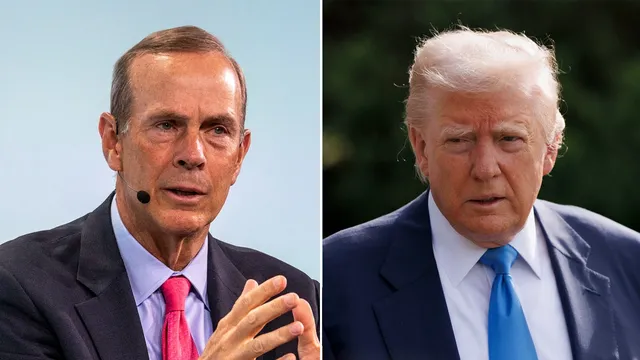
Chevron warns of energy security risks if operations cease in Venezuela
2025-05-04 14:07- Chevron is facing pressure from the Trump administration to halt drilling operations in Venezuela ahead of a license expiration.
- CEO Mike Wirth articulated concerns over the implications for U.S. energy security and the potential for increased Chinese and Russian influence in the region.
- Should Chevron cease operations, it may enable foreign competitors to dominate Venezuela's oil market, posing risks to America's strategic interests.
Express your sentiment!
Insights
In early May 2025, Chevron CEO Mike Wirth raised alarms regarding the potential withdrawal of the company's operations from Venezuela due to the expiry of a Biden-era license. The company, which is currently allowed to export Venezuelan oil to the United States, is under pressure from the Trump administration to stop drilling in Venezuela amid ongoing political turmoil there. Wirth emphasized that halting drilling could jeopardize U.S. energy security, as U.S. refineries are specifically designed to process the type of oil produced in Venezuela. Wirth expressed concerns about energy security, noting that if Chevron withdraws, it would create opportunities for Chinese and Russian companies to fill the void. He highlighted China's increasingly dominant position as the largest buyer of Venezuelan oil, stressing that Venezuelan government officials have been encouraging more purchases by China. This shift would likely result in a stronger Chinese influence in the region, which Wirth believes is detrimental to American interests. Furthermore, the CEO explained that the situation in Venezuela isn't unique, citing similar narratives in Africa and Central Asia where Chinese investment has fostered significant economic control over local governments. As the only American company remaining in Venezuela, Chevron faces a precarious situation where its departure could result in a significant loss of control over local resources. Additionally, he warned that if American companies vacate the region entirely, it would provide foreign powers an unchecked opportunity to assert their influence in the Americas. The complexities surrounding Venezuela's oil reserves, which are among the largest globally, present both opportunities and obstacles. Venezuelan opposition leader María Corina Machado supported Trump's strategy against the Maduro regime, arguing for a transition to a democratic government to restore Venezuela's potential as a leading energy hub in the Americas. Chevron, currently exporting about 240,000 barrels of oil per day, represents a significant fraction of Venezuela's overall oil output, and its future actions could have wide-reaching implications for both the U.S. and Venezuela.
Contexts
The current energy security concerns of the United States are heavily tied to its relationship with Venezuela, a country that sits on one of the largest proven oil reserves in the world. Historically, the U.S. has relied on imports from Venezuela to fulfill its energy demands. However, political instability, economic decline, and sociopolitical crises in Venezuela have complicated this dependency, leading to significant repercussions for U.S. energy security. The collapse of Venezuela’s oil industry, exacerbated by U.S. sanctions and the internal mismanagement of resources, has resulted in a reduced flow of crude oil to America, raising concerns about the potential for supply disruptions. As of now, the dependence on Venezuelan oil is decreasing, with American imports from the country at an all-time low, causing U.S. policymakers to seek alternative sources to strengthen energy resilience. In light of this reality, the U.S. has increased its focus on domestic oil production and diversification of importing sources. The shale oil boom has enabled the U.S. to significantly boost its oil output, allowing the country to mitigate some risks associated with reliance on foreign sources. However, this strategy comes with its challenges, particularly in terms of environmental considerations and the volatility of global oil prices. The geopolitical landscape remains tense, particularly with OPEC adjustments and rival nations potentially seeking to assert influence over oil markets. Therefore, while the U.S. might currently produce enough oil to satisfy its domestic consumption, the global interdependencies and fluctuating market dynamics illustrate the fragility of this situation. Additionally, the U.S. is navigating relationships with other oil-producing nations to secure a stable supply chain that is less reliant on Venezuela. The ongoing conflicts in Ukraine and the Middle East, coupled with competition from producers like Saudi Arabia and Russia, create unprecedented challenges for U.S. policymakers in ensuring favorable conditions for energy security. This complex web of international relationships will dictate future U.S. energy policies and strategies; any significant geopolitical shifts could greatly influence oil prices and supply availability. Furthermore, the emergence of renewable energy sources represents a transformational shift in energy policy in the U.S., with investments increasing in clean energy technology to promote long-term sustainability. However, the transition to renewables must be balanced against the need for immediate and reliable energy sources to maintain economic stability. As the domestic energy landscape evolves, ongoing vigilance on the part of U.S. policymakers is necessary to adapt to the shifting tides of international energy markets and the implications of Venezuela's turmoil. Addressing these energy security concerns will involve not only fortifying relationships with existing oil suppliers and seeking new partnerships but also investing in renewable energy initiatives to secure a more robust and diverse energy portfolio. In summary, while the historical reliance on Venezuelan oil has decreased, the implications of its instability remain a pressing consideration for U.S. energy policy, prompting an urgent need for strategic planning and action to ensure long-term energy security.